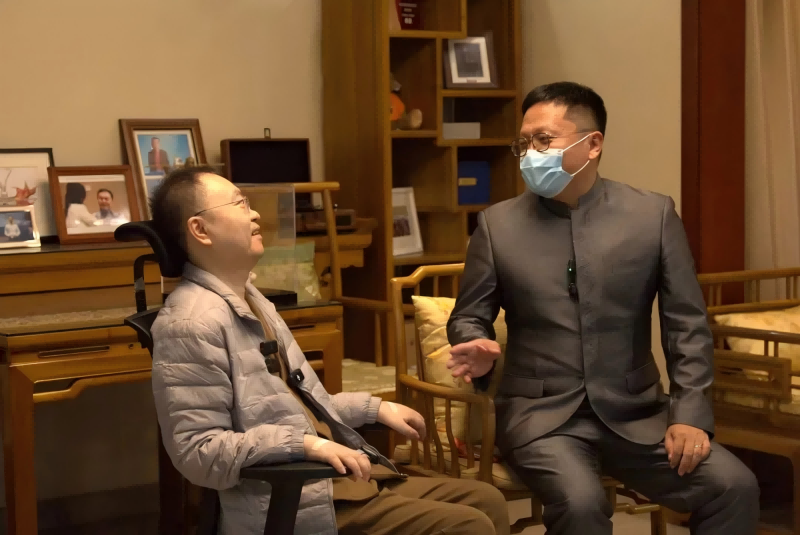As one of the world’s leaders in life sciences, BGI Group are committed to enhancing health outcomes worldwide. This includes fighting diseases such as Amyotrophic Lateral Sclerosis (ALS).
Dr. Yin Ye, BGI Group CEO and Executive Director, recently announced news of BGI’s latest research results in the second phase of the ALS whole genome sequencing project. He also shared the breakthrough discovery of spatiotemporal omics technology in ALS research and its progress in the preclinical stage of drug development.
It has been six months since Dr. Yin last met with Mr. Cai Lei, a sufferer of the ALS disease and a fighter and advocate for patients with ALS. At that time Mr. Cai was in hospital but was able to witness the signing ceremony for the Cai Lei-BGI ALS Multi-omics Research Joint Laboratory. In a recent meeting with Mr. Cai, now out of hospital, Dr. Yin shared the progresses that BGI has made in the battle against the disease.
 On November 26, Dr. Yin Ye (right), met with Mr. Cai Lei in Beijing, China.
On November 26, Dr. Yin Ye (right), met with Mr. Cai Lei in Beijing, China.
Whole genome sequencing reveals new insights into ALS
The second phase of the whole genome sequencing (WGS) project carried out by BGI and the “AskHelpU ALS Patient Platform” involved 259 ALS patients and their families in what was the largest family-wide WGS project in Asia.*
Through detection and in-depth analysis of genetic mutations, the research team revealed that ALS is not a single disease, but a complex disease composed of a series of similar symptoms. By using WGS, the positive detection rate increased by one-third when compared to whole exome sequencing (WES) because WGS is able to detect more complex variant types.
For example, the project detected pathogenic mutations in dynamic mutations in three patients. This could only be accomplished through WGS and provides valuable insights for ALS researchers globally.
In the third phase of WGS sequencing of ALS patients, BGI’s CycloneSEQ long-read sequencing technology will be used to undertake a more in-depth structural variation analysis of the genomes of ALS patients.
Spatiotemporal omics technology reveals new disease mechanisms
Following the detection by BGI of abnormal expression of the interleukin-17B (IL-17B) receptor in the muscle tissue of ALS patients earlier this year, the antisense oligonucleotides (ASOs) therapy for IL-17B has entered the animal experiment stage. Mr. Cai noted that this was an advancement in preclinical research and drug development.
Dr. Yin also updated Mr. Cai on the latest progress of BGI’s spatiotemporal omics technology, Stereo-seq, in ALS research. Myofibers in muscles are a special type of cell made up of dozens, even hundreds, of myocyte nuclei. Spatiotemporal omics with high cellular resolution allows scientists to understand the characteristics of muscle cells at the level of each nucleus, resulting in potential new discoveries.
Currently, spatiotemporal omics research has revealed that new types of repair myocyte nuclei appear in the muscles of ALS patients, with local inflammation and fibrosis signals around them. This demonstrates that while these repair muscle fibers contain repair functions, their appearance also reflects muscle damage and abnormal fibrosis processes that may eventually lead to muscle atrophy.
Researchers are continuing to explore this field with the aim of targeting the muscle microenvironment of ALS patients and identify potential mechanisms and molecular targets that can prevent the progression of muscle atrophy in ALS patients.
It has been nearly two years since BGI Group first started working with Mr. Cai Lei and the “AskHelpU ALS Patient Platform” that he leads. This has been a mutual journey of support and discovery, focused on ALS patients and the pursuit of knowledge that can potentially lead to a cure for this devastating disease. Mr. Cai Lai has been a critical part of this work, not only providing valuable samples and data for the research, but also being an inspiration to the BGI research team in their quest for understanding ALS better.
Dr. Yin and Mr. Cai Lei launched a program in 2023 to provide a free whole-genome sequencing and analysis program for patients with ALS. In August, at the 10th Anniversary of the Ice Bucket Challenge, Dr. Yin doused himself in ice water to complete the challenge and to take the opportunity to educate people about ALS and other rare diseases.
*This project has passed ethical review, complies with national laws, regulations and ethical standards, and strictly protects the privacy and data security of participants.



